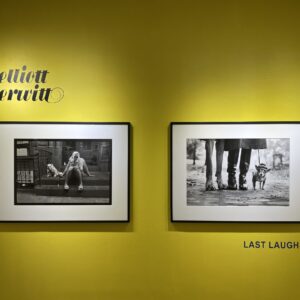JTF (just the facts): A total of 10 large scale color photographs, framed in white and unmatted, and hung against white walls in the two room gallery space and the office area. All of the works are archival pigment prints, made between 2015 and 2019. Each is sized 44×33 inches and is available in an edition of 6. (Installation shots below.)
Comments/Context: At first glance, Ann Shelton’s floral still lifes look like any number of photographs we have all seen before. Elegantly controlled arrangements, inspired by the Japanese tradition of ikebana, sit against brightly colored backdrops, the combinations of plants carefully placed in object-quality vases and lit with the expertise of a commercial photo shoot. Printed large, the images hold the wall with their rich textures and gracefully unbalanced proportions.
Where these photographs diverge from that predictable path is in the backstory to the flowers and plants that have been chosen. Each still life is centered on a specimen that women have used over the centuries to control their fertility and reproductive health – fennel, ginger, yarrow, wormwood, rhododendron, thistle, queen anne’s lace and others. Shelton did extensive historical research into the tonics, treatments, and remedies used by midwives and others, and grew the specific plants herself in her native New Zealand. So while her arrangements are lovely on their own, they are grounded in issues far beyond their decorative surface aesthetics.
Each of Shelton’s works is named for a female stock character – the Comfort Woman, the Vixen, the Courtesan, the Hysteric, the Ingénue, the Floozy, the Child Bride, as well as the Jane Doe referenced in the show’s title – forcing us to link this parade of female stereotypes with the issues surrounding reproductive freedom. And so for those that want to think harder than just looking at pretty pictures of flowers, the photographs offer many more layers of conceptual wrangling.
One line of thinking draws parallels between the exacting control of the practice of ikebana with a similar style of control exerted over female reproduction. Another considers the lost knowledge and heritage these plants represent, and the loss of power and agency that comes with having to rely on doctors and pharmaceutical companies to provide treatment. A third explores the traditional passive femininity of flower arranging and its relationship to women making active choices about their reproductive health. Yet another might be an argument about the disappearance of nature and the collective loss of wisdom that comes from that mismanagement. The more we look at these still lifes through the lens of women’s issues, the more multifaceted they become.
Shelton’s thoughtful brand of feminist flower arranging throws the delicate daintiness of the practice out the window. As much as it might seem unlikely, these are intellectual, in fact subtly angry, activist photographs that encourage women to take back the knowledge that is rightfully theirs.
Collector’s POV: The works in this show are priced starting at $8000 each, and rising incrementally as the editions reach the last available prints. Shelton’s work has little secondary market history at this point, so gallery retail remains the best option for those collectors interested in following up.











